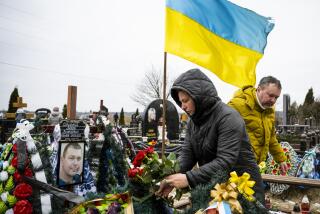Soviets See Power Shift in Gulf Area : Mideast: They worry that U.S. forces may stay after the crisis, which could affect their southern republics and arms reduction talks.
- Share via
MOSCOW — High-ranking Soviet officials sounded a new note of alarm Thursday over the U.S. military buildup in the Persian Gulf region, complaining that the strategic balance in an area near the Soviet Union is being altered to Moscow’s detriment.
“We cannot be overjoyed with the stepping up of American military power in the region in the short term because the situation is becoming more and more explosive, (and) in the long term because there is no guarantee that the United States will leave Saudi Arabia after the crisis is over,” Deputy Foreign Minister Alexander M. Belonogov told a group of Soviet lawmakers.
Soviet officials had warned before, in general terms, that the U.S. forces sent to the region to prevent further Iraqi aggression could kindle a military conflict. But remarks Thursday by Belonogov and Gen. Vladimir N. Lobov, commander of Warsaw Pact forces, were the first to show concern at the long-term implications for Soviet security.
The United States now has more than 60,000 troops in the gulf region, its largest overseas concentration of military force since the Vietnam War, and Lobov told the news agency Tass that he is concerned that this might be the vanguard of a force so great it could exert pressure on events in the troubled southern republics of the Soviet Union.
The Soviet Union is a longtime ally of Iraq, but it vigorously condemned Iraq’s Aug. 2 invasion of Kuwait and voted in the U.N. Security Council for the use of military power to enforce economic sanctions against Iraq. This position has not changed, but Lobov’s remarks reflected concern in military circles at a time when the Kremlin is reducing its armed forces by about 10% and disengaging in East Europe.
Belonogov, addressing the Supreme Soviet’s Committee on International Affairs, said Washington had informed the Kremlin in advance of its decision to send troops to the gulf region, but that Moscow did not approve the decision.
Lobov, who was also present, said he was speaking for himself, but his views presumably are shared by others in the Soviet military hierarchy. He said that if the Americans lose the “legal basis” for keeping troops in Western Europe as a result of German reunification and East-West rapprochement, they could exploit “new possibilities” opened by Iraq’s invasion of Kuwait.
He said that if the Bush Administration follows through on its professed readiness to deploy 250,000 military personnel in Saudi Arabia--which is close to Turkey, a member of the North Atlantic Treaty Organization--a single “arch” of Western forces will thus have been formed to the Soviet Union’s south between NATO’s eastern wing and Saudi Arabia. This, he said, would alter drastically the strategic balance in the region.
“What’s more,” Lobov went on, “Iraq is only 200 kilometers (124 miles) from the borders of Georgia, Armenia and Azerbaijan, which gives the United States an opportunity to exert pressure on events in this region.”
He said the U.S. military buildup could “wreck” the Vienna talks on the reduction of conventional forces in Europe by flooding NATO’s southern wing with troops, warplanes, tanks and other weapons in excess of ceilings being negotiated.
The influence of the Soviet military has waned greatly under President Mikhail S. Gorbachev, so Lobov’s remarks could in no way be taken as the views of the government. However, the fact that Belonogov, the Foreign Ministry’s point man on the gulf crisis, also voiced concern over the U.S. buildup suggests that the attitude is widespread in leadership circles.
In his remarks to the committee, Belonogov said the Soviet Union will lose more than $800 million this year as a result of halting trade with Iraq in compliance with U.N. sanctions. He said undelivered Iraqi oil will account for about $520 million of that, oil that the Soviet Union would in normal circumstances resell to India, Bulgaria, Romania and other countries.
A report in Pravda, the Communist Party daily, said trade between the Soviet Union and Iraq had now stopped. Boris M. Agafonov, executive secretary of the permanent Soviet-Iraqi economic, scientific and trade commission, was quoted as saying that not a single ship carrying goods bound for Iraq or Kuwait had sailed from a Soviet port since Aug. 6, when the Security Council approved the sanctions.
An estimated 7,000 Soviet citizens reportedly remain in Iraq, and according to Belonogov, 5,000 of them continue to work on construction sites in southern Iraq despite the U.N. sanctions.
“As regards our economic cooperation, we continue to work on existing facilities where our specialists and material and technical resources are involved,” Agafonov told Pravda. “This is no violation of the Security Council sanctions, as we are not engaged in any commercial activity.”
Nevertheless, according to a report on “Vremya,” the main television news program, some members of the Supreme Soviet committee demanded the withdrawal of all Soviet specialists from Iraq, including 193 experts who Moscow admits are still teaching the Iraqi armed forces how to use weaponry acquired from the Soviet Union before the present crisis erupted.
More to Read
Sign up for Essential California
The most important California stories and recommendations in your inbox every morning.
You may occasionally receive promotional content from the Los Angeles Times.













